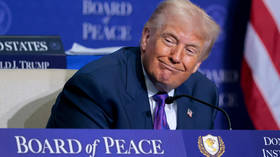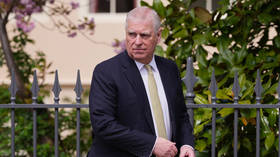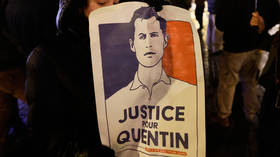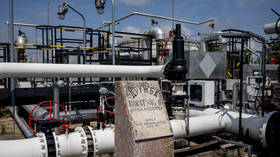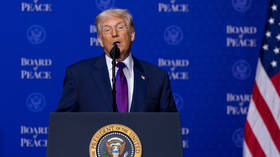UK parliamentary pay: Party leaders taking MPs back 200 years
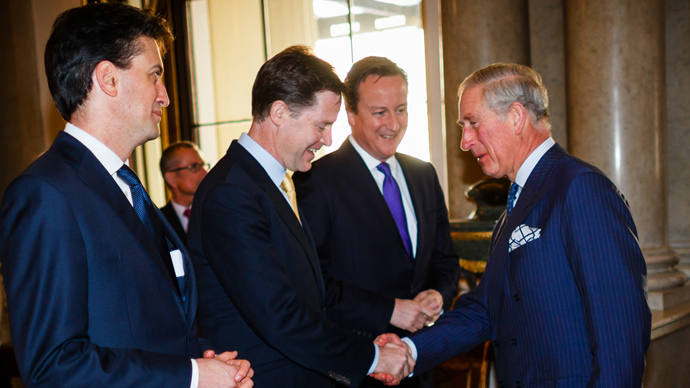
The paralysis that is British parliamentary democracy took a further excruciating nosedive this week with all three party leaders 'agreeing' that MPs should have their real pay levels reduced!
Our elected representatives must show, it seems, that they are prepared to suffer, to stand by impoverished workers queuing for food handouts, while the rich loot the nation.
When looked at alongside party leaders' 'consensus' that bankers should not be jailed, that fraudulent debts must be paid, that energy cartels must never be broken up and that law-abiding citizens must be prepared to die for the mistakes of the bankers, Cameron’s, Clegg’s and Miliband's unanimity on key policies show Britain's' spellbound political leaders think Britain is a one-party state.
But, since it's clearly not the public’s, whose interests does Britain's one party serve and how did it come to pass that MPs are no longer allowed to set their own wages? For the answer to both these questions, one has to travel back in time to 2008 and pick over the bones of the year's two big stories: the MPs’ expenses scandal and the largely-London-led international bank bailout.
Who dares wins - SAS steal a government hard drive
It's strange how easily the nation has forgotten the 'hero' behind the raid that landed a hard drive containing all the private expenses of British MPs on the desk of the editor of the establishment's Daily Telegraph, William Lewis, precipitating the 2008 'MPs’ expenses scandal'.
The story won awards and put tens of thousands on the Telegraph's circulation figures but, more importantly, enabled the newspaper to pick and choose who and what it would expose, giving Lewis the sort of king-making and king-breaking power the Borgias could only dream of.
As the gleeful bankers were making off with the 850-billion-pound taxpayer bailout loot, the expenses scandal rotated the media spotlight away from the City of London and focused it on to the parliamentarians. Without the scandal, MPs and Lords may well have been able to do much more to protect public assets as they slipped away by the barge load down the Thames.
The hard drive with MPs private expenses data was stolen from the Speaker of the House of Commons' office by former SAS Major John Wick. Trained by the taxpayer, he found his army skills in demand so formed International Security Solutions Limited. The money was rather better in the private sector. The Telegraph's owners, the Barclay Twins' friends, were able to pull strings. Far from being charged with theft of a hard drive from the Palace of Westminster, he found himself being congratulated at party after party thrown in his honor by London's financial elite.
As the finer details of the extravagant expense claims rolled out in the Telegraph, they sent a shiver down the spine of every MP. Almost.
We are supposed to believe that all Details of Tony Blair's expenses claims were accidentally 'shredded'.
The Telegraph released scandals of misappropriated expenses over a period of months, usually calling the politician the night before their 'pay per view' movie list or 'duck house' was paraded before the public. The Telegraph went easy on the political pets of the City of London who were being groomed, for example, as Cameron's henchmen to take office in the 2010 elections.

Not wishing to burst the Telegraph's bubble, but the big scandal of the year never really was a scandal at all. Nobody in Westminster was surprised that MPs were claiming more than they were strictly allowed. It had proved politically difficult to raise MPs salaries in line with inflation in the few years up to 2007, so expenses rules were relaxed to compensate them for not getting a real pay rise.
Yes, this 'big story of 2008' was a sophisticated entrapment operation. A psychological war game to divert attention from The City, which was running away with 850 billion quid of taxpayer's money and paying themselves 16 billion of it in a 2008 bonus bonanza for fraud and criminal incompetence. It was deliberate scapegoating for the heist of the century.
19th-century Chartists understood MPs must be well-paid
So why do Westminster politicians deserve a hefty pay rise, why are all three party leaders set against it? If politicians are elected without cash to back them up, those that voted for them needn't have bothered. Democracy has to be backed with hard cash. Donations, as all advanced democracies know, are a conduit for corruption. Politicians and political parties end up being bribed and these charlatans start to thrive.
In the 1830s, MPs were unpaid, making politics a career chiefly reserved for wealthy merchants and their lawyers. In the heady days of 1838, industrial revolutionary unrest was articulated in the 'People's Charter', which demanded a respectable wage for MPs as one of its six articles. An increasingly-educated populace was beginning to see through their bosses' pleadings of poverty, to see the 'Dark Satanic Mill' owners' avarice under the veil.
The People's Charter was championed by trades unionists, writers, activists and a whole family of 'Chartists'. Theirs was a largely peaceful movement to bring about a House of Commons that truly represented a cross-section of opinion in the country rather than just the rich, landed few.
The other five Chartist demands were for annual parliaments; one man one vote; equal electoral districts; an end to candidates having to be landowners and voting by secret ballot. Though, just like the English Civil War Levelers two centuries before them, the Chartists dissipated without reaching their goals, these common sense ideals refused to die. One by one, over the next century most Chartist demands were enshrined in law.
The sad irony in all this though is that by 1928, when everyone over 21 was given the vote, the previous generations of landowners and merchants had voted themselves all the common land. Privatized the greatest national asset through private Enclosure Acts through a landowners' parliament. Englishmen could vote, but they were landless, tied to paying rent and unable to feed their families, so had become servants in 'invisible handcuffs' to the few families with the land and money.
Cameron, Clegg and Miliband the Muppets
So that's why I damn these three 'Muppets' Cameron, Clegg and Miliband. None of them have any interest in making Britain work for the 95 percent. The policies they espouse are concentrating national resources in fewer and fewer hands and they are doing the loan sharks' bidding in turning us into a nation of debt slaves.
When they pass their political sell-by date they will all, like Tony Blair, get top billing on the Power Elite's speaking circuit. Damn each of their luxury political yachts to the bottom of the deep blue sea and let's dream instead of a day when politicians find enough backbone to choose a leader for their integrity and political vision rather than the fawning they attract from the financial elite and their disciples in the media.
So pay Britain's MPs properly. They are the only the only thing that stands between 60 million citizens and a financial elite which offers only a Hobson's choice: you can be either a slave chained by wages, or boiled alive in a cauldron of unpayable debt.
Our elected politicians may yet, like they did over Syria, show some spine in the financial fist fights of the future. Britain is, after all, the closest country - at only 500 miles - to Iceland.
The statements, views and opinions expressed in this column are solely those of the author and do not necessarily represent those of RT.
The statements, views and opinions expressed in this column are solely those of the author and do not necessarily represent those of RT.




